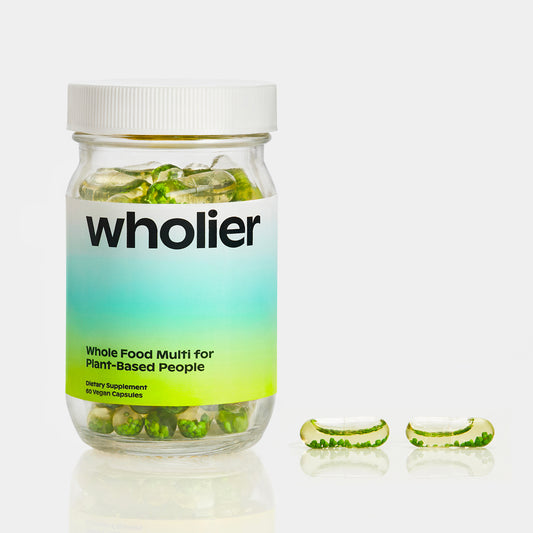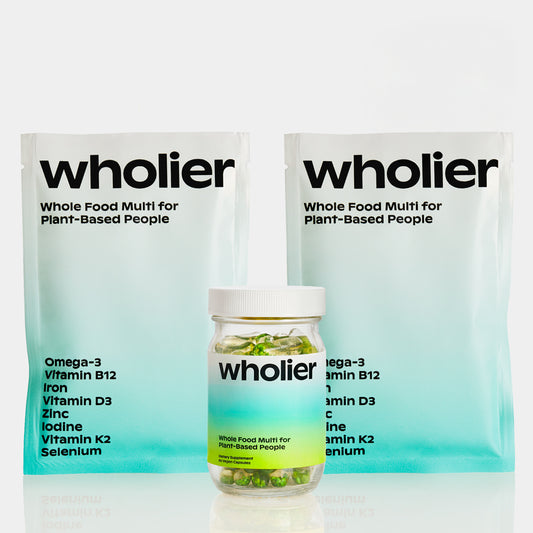
Getting Enough Omega-3s on a Vegan Diet
Omega-3 fatty acids are essential for maintaining good health, particularly for brain function, heart health, and joint health. While there are three types of omega-3s, alpha-linolenic acid (ALA), eicosapentaenoic acid (EPA), and docosahexaenoic acid (DHA), EPA and DHA are particularly important for overall health, especially when combined. EPA has anti-inflammatory effects, while DHA is important for brain development and function. Together, they can help reduce the risk of heart disease, improve cognitive function, and support joint health (1).
The ideal ratio of DHA to EPA is at least least 2:1.
For vegans, the best source of omega-3 fatty acids is from algae, the same source from which fish get their EPA and DHA content. There are many vegan-friendly supplements that contain algal oil, such as algal oil capsules and vegan omega-3 supplements. Clinical studies show that algal oil supplementation can increase omega-3 levels in the blood, with no adverse effects (2).
When choosing an omega-3 supplement, it's important to look for a product that contains both EPA and DHA, with a ratio of at least 2:1 (DHA to EPA). Clinical studies have shown that a higher ratio of DHA to EPA can have greater benefits for brain health and cognitive function (3).
Plant-based sources of omega-3s, such as flaxseeds, chia seeds, hemp seeds, and walnuts, contain ALA, which can be converted to EPA and DHA in the body. However, the conversion is not very efficient, making it difficult to obtain enough EPA and DHA from plant-based sources alone. Clinical studies suggest that the conversion rate of ALA to EPA and DHA is less than 5% for EPA and less than 0.5% for DHA (4).
Clinical studies have shown that supplementation with 200-300mg of algal oil per day can increase plasma levels of EPA and DHA in vegans.
To ensure adequate intake of omega-3s, it's recommended to consume at least 200-300mg of combined EPA and DHA per day. This can be achieved through a combination of supplements and plant-based sources or solely through supplements. Clinical studies have shown that supplementation with 200-300mg of algal oil per day can increase plasma levels of EPA and DHA in vegans (5).
Scientific research has shown that omega-3 fatty acids play a vital role in brain development and function, reducing inflammation in the body, and supporting heart health. In addition, clinical studies have suggested that omega-3s may have benefits for joint health, eye health, and the prevention of certain cancers (6).
Omega-3 fatty acids are essential for overall health and wellbeing, and the combination of EPA and DHA is particularly important for brain function, heart health, and joint health. For vegans, the best source of omega-3s is from algae-derived supplements, with a recommended ratio of at least 2:1 (DHA to EPA). By incorporating omega-3 supplements and plant-based sources into a balanced diet, vegans can ensure they are meeting their daily omega-3 needs and obtaining the many health benefits associated with these essential fatty acids.
Sources:
(1) Omega-3 Fatty Acids: Fact Sheet for Health Professionals. National Institutes of Health. https://ods.od.nih.gov/factsheets/Omega3FattyAcids-HealthProfessional/
(2) Saunders, A. V., & Craig, W. J. (2020). Algal supplementation of vegetarian eating patterns improves plasma and erythrocyte long-chain omega-3 fatty acid concentrations and omega-3 indices: a systematic literature review. Journal of the Academy of Nutrition and Dietetics, 120(3), 389-403. doi: 10.1016/j.jand.2019.08.024
(3) Sinn, N., & Bryan, J. (2008). Effect of supplementation with polyunsaturated fatty acids and micronutrients on learning and behavior problems associated with child ADHD. Journal of Developmental & Behavioral Pediatrics, 29(6), 467-478. doi: 10.1097/DBP.0b013e31818b26bb
(4) Burdge, G. C., & Calder, P. C. (2005). Conversion of alpha-linolenic acid to longer-chain polyunsaturated fatty acids in human adults. Reproduction, Nutrition, Development, 45(5), 581-597. doi: 10.1051/rnd:2005047
(5) Saunders AV, Davis BC, Garg ML. Omega-3 polyunsaturated fatty acids and vegetarian diets. Med J Aust. 2013 Aug 19;199(S4):S22-6. doi: 10.5694/mja11.11507. PMID: 25369925.
(6) Omega-3 Fatty Acids. American Heart Association. https://www.heart.org/en/healthy-living/healthy-eating/eat-smart/fats/omega-3-fatty-acids





